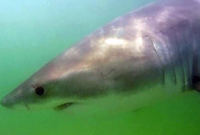Support strong Canadian climate journalism for 2025
This article was originally published by The Guardian and appears here as part of Canada's National Observer's collaboration with Climate Desk.
Katharine, a 14-foot-plus great white shark with a Twitter following, appeared again off the U.S. east coast last week. A transmitter attached to her dorsal fin had not sent out a definitive message for a year and a half.
The transmitter that was attached off Cape Cod in August 2013 is roughly half the size of an iPhone and is meant to ping whenever the shark breaks the ocean surface.
Great whites can go for long periods without surfacing. Katharine did so off South Carolina in May 2019, according to a map maintained by Ocearch, the group tracking her. This spring, Ocearch said it thought Katharine might have been heard from “about 200 miles off the coast of Virginia.”
But last Monday, the group said she had definitely been recorded, hundreds of miles off the same state.
In a post to the Ocearch Facebook page, Dr. Bryan Franks of Jacksonville University wrote: “Katharine is alive and well … Katharine pinged in multiple times yesterday, confirming it was not a fluke.”
Tags used on Atlantic white sharks “normally only send data to us for five years,” Franks said, which meant it was “very unusual for us to hear from a shark for this length of time, and it’s exactly the type of data that we are looking for to help put together the puzzle pieces or her life, and other (northwest) Atlantic great white sharks like her.
“Katharine showed movement patterns indicative of being a reproductively mature female white shark with trips during some winters out into the open ocean.
“Her tracks over the past seven years up and down the coast from Cape Cod to Florida and with long forays to the Grand Banks of Newfoundland, the eastern Gulf of Mexico, and the offshore Atlantic, may cover the movements of two or three cycles of pregnancy and birth of her pups.
“She has already provided an incredible dataset with more than 1,700 locations, covering 37,000 miles of ocean since the day she was tagged. It will be fascinating to see where her next moves may be.”
Some have criticized Ocearch’s use of social media to publicize their work. Others point out that it raises the profile of a vital conservation effort.
Katharine was named for Katharine Lee Bates, the 19th-century lyricist who wrote America the Beautiful. After the shark resurfaced at an ugly time for American democracy, her Twitter account began tweeting again.
“Miss me?” Katharine asked her 62,000 followers, adding, in reference to the coronavirus pandemic: “So everyone knows YES I was wearing a mask when I came up.”
In response to a user who suggested she had resurfaced in time for the presidential election, she wrote: “I mean. I was chasing a fish, but I’ll roll with it.”
On Friday, with the election result stuck in a midnight zone of vote counting and partisan warfare, she added: “Safe to come up again? Ya’ll are having a crazy week up there.”
In fact, Katharine is not the most popular great white on Twitter. An account for a shark called Mary Lee has 132,000 followers. According to Ocearch, her transmitter has not pinged since June 2017.




Comments